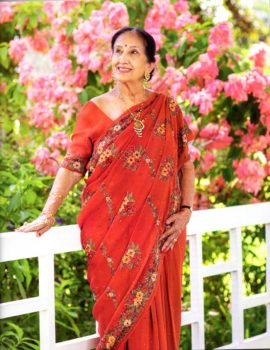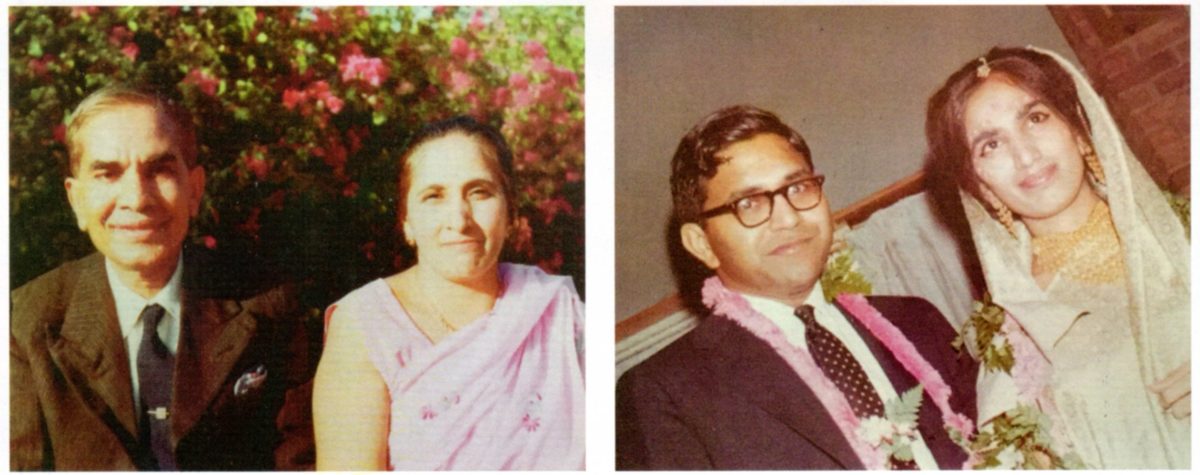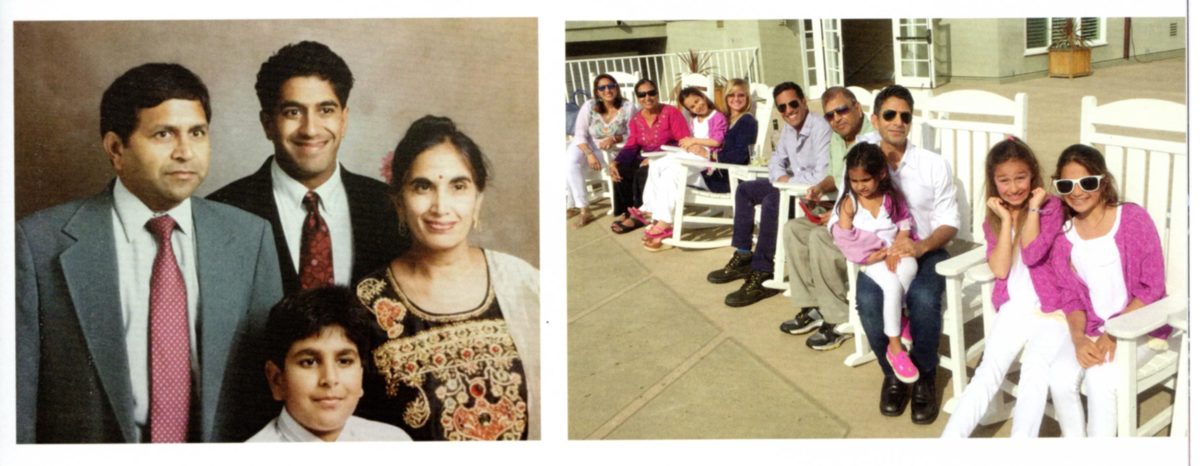 Darkness hung over Pakistan’s Port of Karachi as five year old Damyanti followed her parents up the metal ramp and onto the waiting cargo ship. She wore her finest fork, a dress made by her ma’s own hand, and she walked slowly, sandwiched single-file, between her mother and grandmother. She eyed the blue silk of her mother’s sari as it moved like waves in a gentle sea as she stepped onto the ship poised to take her from her home. Her family, like ten million others, had become displaced; instant refugees in an emerging crisis. The family rose early in their small town of Sindh, taking only what they could carry, the rest of their belongings to be reclaimed by another family who despite the harsh political/religious environment, chose or were able to stay. Over 200 years of British occupation had ended and a bloody religious war between the Hindus and Muslins caused the physical division of Damyanti’s home country. Overnight their home in India had become part of Pakistan. She could hear water slapping the sides of the ship as it pulled away from port. Large brown eyes looked up into the strong faces of her ancestors.
Darkness hung over Pakistan’s Port of Karachi as five year old Damyanti followed her parents up the metal ramp and onto the waiting cargo ship. She wore her finest fork, a dress made by her ma’s own hand, and she walked slowly, sandwiched single-file, between her mother and grandmother. She eyed the blue silk of her mother’s sari as it moved like waves in a gentle sea as she stepped onto the ship poised to take her from her home. Her family, like ten million others, had become displaced; instant refugees in an emerging crisis. The family rose early in their small town of Sindh, taking only what they could carry, the rest of their belongings to be reclaimed by another family who despite the harsh political/religious environment, chose or were able to stay. Over 200 years of British occupation had ended and a bloody religious war between the Hindus and Muslins caused the physical division of Damyanti’s home country. Overnight their home in India had become part of Pakistan. She could hear water slapping the sides of the ship as it pulled away from port. Large brown eyes looked up into the strong faces of her ancestors.
“What is gone, is gone,” her 25 year old mother, Gopibai Hingorani, gently told her, “Now we must look forward.” Without employment, finances or contacts, they traveled to the bustling city of Bombay (Mumbai). Amidst lively sounds of street peddlers, taxi horns and hurried drivers, this young family created a new foundation upon which their future would be built and in-turn it changed the course of young Damyanti’s life.
“My mother was a visionary,” Gupta said. “She only had a fourth grade education, yet she was wise and very talented. She sewed and cooked for jobs, while my father became a pharmacist and eventually owned a small medical shop. Every day my mother would look into my eyes and tell me that I could do anything I wanted,” Damyanti, now called Rani, said. “She said I was special and promised to do everything in her power to make my dreams come true. Quite a statement when we had so little. She said she would make certain I would have something that no one could ever take from me; a good education.”

Like her mother, Gupta visualized her future. “I always dreamed what I wanted in my life,” she said. “But dreams alone are not enough. My parents and grandparents taught me to block out everything that would take me away from my goal and to work hard to achieve what I wanted. I followed their advise and did just that.”

The Prime Minister of India, Pandit Jawaher lal Nehru, came to Baroda (Vadodra) where the family settled in 1955 when Damyanti was 13. She rode her bicycle to the polo ground where he was to speak, found a space near the podium, pulled a red handkerchief from her pocket, smoothed it out upon the brown dirt and sat, cross-legged, waiting to be inspired.
“He said that after years of British rule we finally have freedom,” she recalled. “But, we have no industry, he told us. We need people to do technical jobs and we need engineers,” Gupta said. “The Prime Minister told us that he wasn’t just talking to the boys, he was also talking to the little girls in the crowd. I knew in that moment that I wanted to be an engineer.”
Gupta was the first female to attend the College of Mechanical Engineering at Varudra University in India, where initially they didn’t even have a bathroom for females. They soon built one, however, as they, too, saw her tenacity and exceptional spirit. “No one should ever tell you, how to be you,” she said. “It is up to you to find your passion and then to create your path.” At the age of 19, while at the University, Gupta read a book about Henry Ford and a new dream appeared on her horizon.
Following graduation, utilizing her parent’s life savings, a determined Damyanti left India and went to Germany before coming to America. To make her dream a reality she traveled to Detroit, Michigan, applied to Ford Motor Company and was turned away. Months later she tried again, explaining to them that they will never know what a woman engineer can do for them until they hire one. Gupta became the first female with a Masters Degree in Engineering (from Oklahoma State University) to be hired by this prestigious company. Her supervisor asked her to choose a nickname as Damyanti was thought to be too hard to say. She chose the name, Rani, due to its Hindi translation. “Everyday they called me Queen,” she said with a broad warm smile and eyes like the sun. “I don’t think they ever knew that.”
Gupta views life’s adversities as possibilities.“Life is going to be a rollercoaster,” she said. “There is always a thrill in the up and the down. Challenge comes from hardship and learning comes from failure. Do not be afraid of any of it,” she said, the melodic accent of her childhood still evident in every word.
At 77 years of age, she looks back on a satisfying life. “My father always said that satisfaction is more important than success and I am a content woman.” Gupta met her husband when she was driving through Ann Arbor after moving to Detroit. Her car had broken down and she searched the white pages at a phone booth for the first Indian surname she could find. She called the number and Subhash, not only answered his friend’s phone but offered to come to her aid. The stars collided, they fell in love, married and had two sons, Sanjay and Suneel.
As she spoke of her family, Gupta’s wide smile broadened and her gentle eyes beaconed you closer. “I’m proud of my family. My son Sanjay is a neurosurgeon, chief medical correspondent for CNN, and won the medal of honor and several Emmy awards,” she gushed. “And Suneel is an entrepreneur, a lawyer and has an MBA. He is a visiting scholar with Harvard, ran for Congress and was nominated to the Supreme Court bar,” she beamed. “We have five granddaughters. No grandsons,” she smiled. “God must have a plan for these girls. My daughter-in-laws are also educated women with college degrees. They are both accomplished, but if my granddaughters need anyone stronger, they have me. You can’t push children, but they will follow.”
Rani Gupta has known who she is since she breathed her mother’s early visualization into her soul. She exemplifies the brave, intelligent, loving and steadfast woman that causes other women to want to be in her presence. “Everything happens for good,” she said, “but it takes education, dreams and patience to see that. If not for apartheid I would not be where and who I am today. The good things in my life happened after something bad. While you wait to see the beauty, work as hard as you can to create a very satisfying life.”
Chairity:
The mission of the Gupta Family Foundation is to support organizations which provide focused intervention in the lives of individuals disadvantaged by poverty, disability or discrimination around the world. Their goal is to help them become self-sufficient. www.guptafamiyfoundation.org
